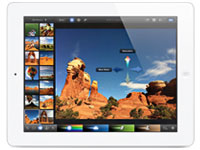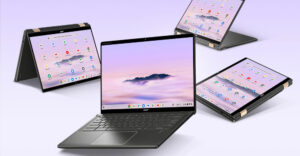
Any vendor can be beaten, and Apple was beaten badly in the years between Steve Jobs’ terminationat the company and his triumphant return. On the other hand, Apple continues to execute very well,even though Cook is making what appear to be critical early mistakes in terms of priorities.
The company does look vulnerable, which is why I’m suddenly in a lot of meetings strategizing how totake advantage of Apple’s apparent new condition. Apple is by no means a pushover, either. Itcontinues to outpace its competitors in retail execution and in maintaining customer loyalty. It continues to lead the tablet and smartphone market.
What follows is not a prediction, though I doubt that will stop thick-headed Apple loyalists from calling it one and then gleefully saying it was wrong. It’s actually just my idea of a successful strategy that could replace Apple at the top of the consumer electronics pile.
I’ll close with my product of the week: the Nvidia Tegra version of the HTC One, a smartphone that stands out as one of the best in the Android class and one that showcases why Apple will likely need to make sure the iPhone 5 has a bigger display and 4G support.
The Survey Says Steve Jobs Was Right
Everyone and their brother is doing market research in preparation of the second half of the yearwhen a ton of folks are going to once again target Apple. Survey results are pretty consistent in thatusers are saying they love touch for pretty much everything but they are not satisfied with the lack ofbreadth for creation in all tablets — but the vast majority of those surveyed are on iPads.
In short, theproblem is that for anything other than short notes or queries, they want the option of converting theirtablets to mini laptops — and to get there, most are either wedding their tablets with a keyboard or stillcarrying their laptops. Neither approach is ideal.
You may recall that when first asked about tablets, Steve Jobs basically said they were stupid becausefolks really needed keyboards. While he positioned the iPad as a tablet, he also released a wirelesskeyboard that actually made it into a convertible. However, given Microsoft was far more successful withlaptops, he played down the conversion so the result wouldn’t appear like the failed netbook concept.
By doing it this way, people didn’t see the result as a crippled keyboardless netbook but as somethingnew, unique and attractive. But Jobs was clearly right that when it came to actually doing work, folkspreferred a physical keyboard over a virtual one.
The surveys suggest that while it is clear the convertible concept is the most popular, peoplemight actually prefer one that favors the laptop form over the tablet form. In fact, currently there arefar more people who use laptops than tablets as their default personal hardware. Even if they havean iPad, they still use their laptops or traditional PCs more often.
Beating Apple
This suggests a two-step strategic approach to dethroning Apple — but the first step isn’t optional, andtraditionally most competitors attempting to displace a leading vendor skip it.
That first step is to make the market aware of the fact that it is actually dissatisfied with the iPad in itscurrent form. Clearly the surveys indicate people want something different, but they also indicate thatthese users are satisfied — and actually still impressed for the most part — with their iPads.
If their unmet needsaren’t first translated into dissatisfaction with their iPads, then the second step won’t work, because the iPadwill remain the gold standard, and nothing that doesn’t originate from Apple will be able to beat it inwhat will remain an iPad tablet segment.
We saw Apple attempt this during the Windows Vista years, when they took people’s issues with Vistaand magnified them so they translated into a level of dissatisfaction that would allow a competitivemigration to Macs, and then Apple gained share. Until they started that program — even thoughWindows Vista initially truly sucked — they didn’t gain share.
Step two is to bring out a product that targets this dissatisfaction and resets the bar for buyersaround a convertible product that favors laptop use. That will be a larger, heavier product, which iswhy it is important to reset the bar first. Otherwise, reviews will pound it for being larger and heavierrather than praise it for doing what the iPad can’t.
This is all about managing perceptions, but thedevice likely can’t be larger than 13.3 inches — the smallest mainstream notebook screen size — and it can’tbe more than 3.5 lbs., which is mid-range in the Ultrabook class but historically well below traditionalWindows tablets, which often weighed well over 4 lbs.
People will make tradeoffs for flexibility, but if the combination of a MacBook Air or Ultrabook and atablet is still lighter, they may prefer that — and Apple will hold on as dominant.
Wrapping Up: Will Someone Beat Apple’s iPad? Yes!
I have yet to see either a strategy that matches what I’ve described or a product that falls within therequirements I’ve listed, and until I do, Apple likely holds. So, were I to make a prediction today, I’d sayApple holds this class through the fourth quarter.
Strategies and hardware remain in flux as I writethis, however, and I’m aware of products under consideration at several vendors that could, with some minortweaking, meet the requirements. The harder thing will be the marketing, because only Apple has mounted –at least in this segment — the kind of sustained competitive campaign that would be required.
So right now, only Apple has the combination of demonstrated skills to create and execute a strategyto replace the iPad.
However, I’m watching a relatively steady trickle of second-tier executives leavingApple, suggesting that this is changing — but I doubt it is changing enough to impact the fourth quarter.
With the right team, funding and strategy, Apple’s iPad could be beaten. Still, I remain skeptical that itwill be — by anyone but Apple — at least, not in the near term.
Apple will eventually replace the iPad, and I can imagine a bunch of folks will say, “Duh, wish I’d thought of that!”
Product of the Week: HTC One
 The HTC One X is a good example of a new class of phones that test better than the iPhone andshowcase that, at least from a hardware perspective, Apple can be beaten.
The HTC One X is a good example of a new class of phones that test better than the iPhone andshowcase that, at least from a hardware perspective, Apple can be beaten.
The HTC One X has a 4.7-inch OMLED screen, which while lower resolution than Apple’s, has deeper blacks and brighter colors — both aspects of OMLED. It uses smaller files, so you are less likely to be throttled if you are streaming or downloading pictures.

The Tegra 3 quad-core phone I got to play with is currently available only inEurope and also showcases why a service like Street Talk, which was last week’s product of the week, ishandy.
No contracts or penalties for using unlocked international phones means you can trulyhave a phone like this one that no one else you know will likely use.
Everyone and their brother having the same device isn’t an attractive aspect of the iPhone for me –and while Apple may feel we are all alike, I respectfully differ. So, bigger display, deeper colors, moreindividuality, potentially longer battery life (more than 14 hours in test with WiFi on), and the combination ofHTC Sense and the latest Android version make it stand out.
In addition, it has a vastly more robustscratch-resistant screen protecting case, and it is configured for a car mount, which when tied to the matcheddock — I ordered one off eBay from Europe — creates a vastly better in-car experience. Those extras, plus its quad-core performance, make for a compelling alternative to the iPhone.
Be aware there are two HTC One products. The one in the U.S. is based on the Qualcomm Snapdragon S4,and the initial performance numbers for both offerings are surprisingly close. So, regardless of internalsgiven, the HTC One showcases that Apple can be beaten — and given that is consistent with this week’spremise, the HTC One X is the perfect choice for my product of the week.




















































